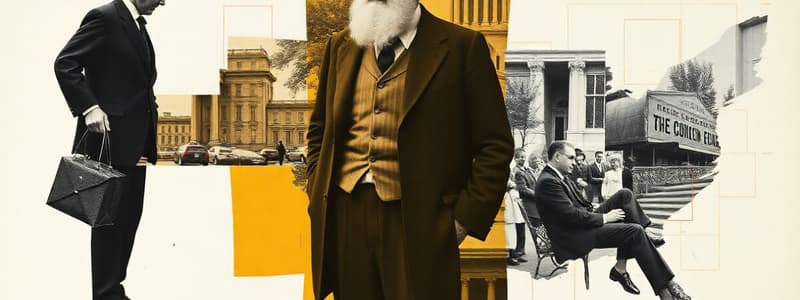Podcast
Questions and Answers
What was the main concern of the government as the power of giant corporations grew?
What was the main concern of the government as the power of giant corporations grew?
- High wages being paid to workers
- Increase in charitable contributions from wealthy business owners
- A lack of free competition in the marketplace (correct)
- Lack of investment in the agricultural sector
What did the Sherman Antitrust Act of 1890 aim to achieve?
What did the Sherman Antitrust Act of 1890 aim to achieve?
- Increase charitable contributions by wealthy individuals
- Promote free competition and prevent monopolies (correct)
- Illegally form trusts and maintain monopolies
- Encourage the formation of monopolies
Why was the Sherman Antitrust Act difficult to enforce?
Why was the Sherman Antitrust Act difficult to enforce?
- Most cases were won in favor of the trusts
- It required large corporations to form multiple trusts
- The definitions of trusts and monopolies were unclear (correct)
- The support for large corporations was overwhelming
What change did large companies make to avoid prosecution under the Sherman Antitrust Act?
What change did large companies make to avoid prosecution under the Sherman Antitrust Act?
What was a significant difference in economic conditions between the North and South during the industrial growth period?
What was a significant difference in economic conditions between the North and South during the industrial growth period?
What economic philosophy was favored by business leaders in the late 1800s to maintain their independence?
What economic philosophy was favored by business leaders in the late 1800s to maintain their independence?
Which theory supported the ideas of competition and hard work among business leaders in the late 1800s?
Which theory supported the ideas of competition and hard work among business leaders in the late 1800s?
How did Andrew Carnegie primarily aim to control the steel industry?
How did Andrew Carnegie primarily aim to control the steel industry?
What was J.P. Morgan's strategy to gain control over various industries?
What was J.P. Morgan's strategy to gain control over various industries?
What was the primary purpose of John D. Rockefeller's trusts?
What was the primary purpose of John D. Rockefeller's trusts?
What economic outcome resulted from the monopolies created by Carnegie, Morgan, and Rockefeller?
What economic outcome resulted from the monopolies created by Carnegie, Morgan, and Rockefeller?
What was one of the major criticisms against the business practices of late 1800s entrepreneurs?
What was one of the major criticisms against the business practices of late 1800s entrepreneurs?
What effect did monopolies have on the choices available to consumers during the late 1800s?
What effect did monopolies have on the choices available to consumers during the late 1800s?
Flashcards are hidden until you start studying
Study Notes
Economic Landscape of the Late 1800s
- The late 1800s fostered an environment ideal for business expansion and wealth accumulation.
- Free enterprise allowed individuals and private businesses to control most industries without government intervention.
- Business leaders embraced laissez-faire capitalism, prioritizing independence and profit maximization over governmental regulation.
Ideological Influences
- Social Darwinism emerged, promoting the idea that "natural selection" favored the economically successful and justified competition and hard work.
- While the wealthy supported this theory, it faced criticism from others who saw it as exploitative.
Entrepreneurial Control Techniques
- Entrepreneurs sought to eliminate competition through aggressive strategies.
- Andrew Carnegie utilized vertical integration by acquiring suppliers of raw materials and logistic companies.
- Carnegie also employed horizontal integration by merging with or buying out other steel companies.
- J.P. Morgan focused on consolidating businesses, forming new companies that bought stock to gain control over various industries including steel and railroads.
- John D. Rockefeller created trusts, allowing competing companies to be managed under a single group of trustees to control the oil industry.
Monopolies and Market Consequences
- Carnegie, Morgan, and Rockefeller each established monopolies, exerting complete control over production and pricing in their respective industries.
- The rise of monopolies limited consumer choices and forced workers into acceptably lower wages with few job alternatives.
- The actions of wealthy industrialists sparked public debate, with some viewing them as "robber barons" for their exploitative practices despite philanthropic efforts.
Regulatory Responses and Challenges
- Growing corporate power led to governmental concern over the decline of free competition.
- In 1890, the Sherman Antitrust Act aimed to restrict the formation of trusts and monopolies, promoting competitive markets.
- Enforcement issues arose due to unclear definitions of trusts and monopolies, and court rulings often favored large corporations, hindering the act's effectiveness.
Regional Economic Disparities
- While the North experienced industrial prosperity, the South struggled to recover post-Civil War, remaining largely agricultural with limited investment opportunities.
Studying That Suits You
Use AI to generate personalized quizzes and flashcards to suit your learning preferences.




